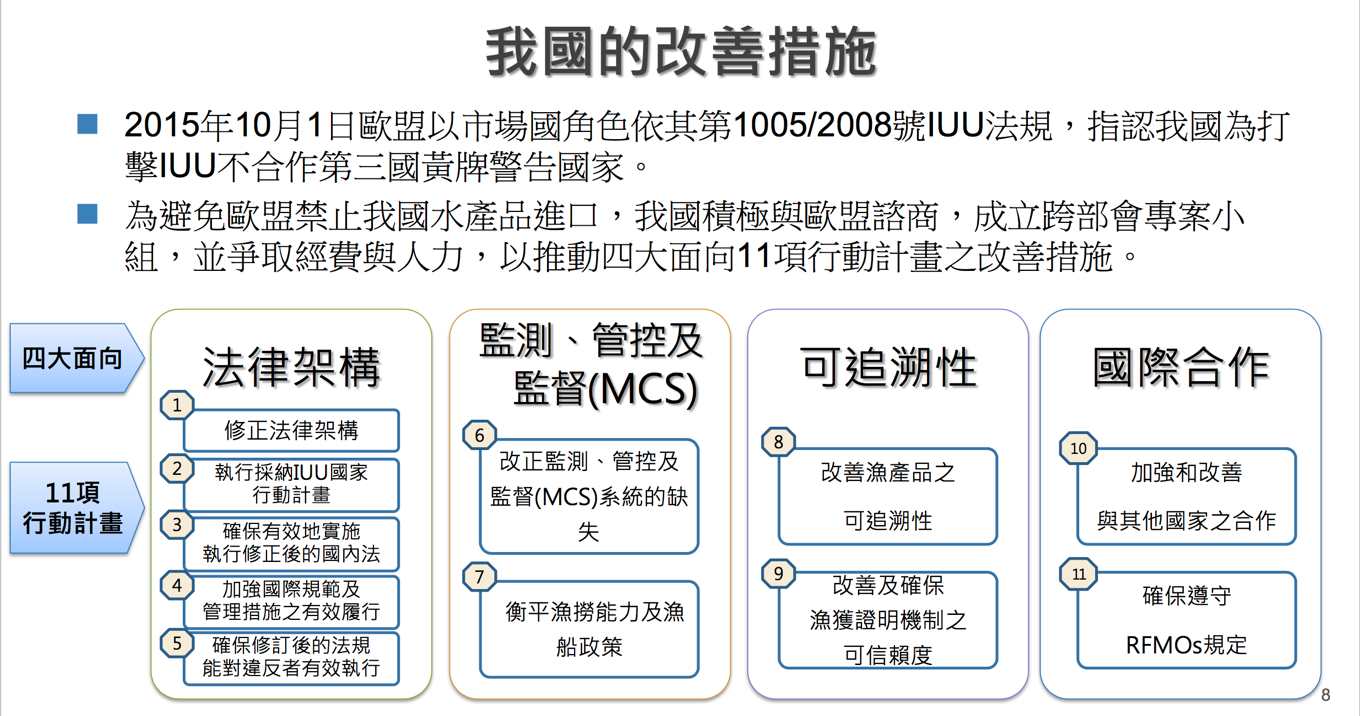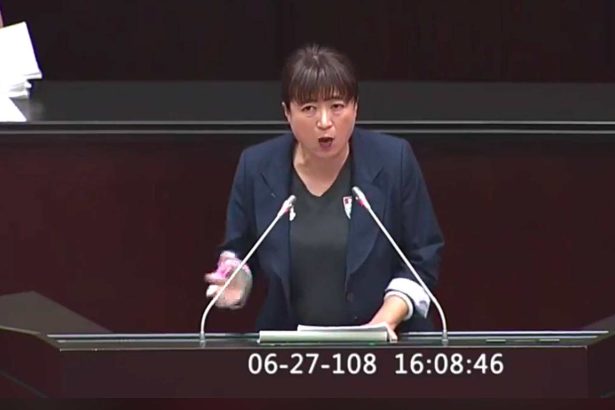Good news! The yellow card of fishing in Taiwan has been lifted! EU: witness Taiwan's determination to crack down on illegal Fisheries and will support Taiwan
1271 share
After nearly four years of efforts, Taiwan has finally successfully lifted the EU fishing yellow card! EETO said that the EU is aware of the reforms Taiwan has made in the past three and a half years to combat illegal, unreported and unregulated (IUU) fishing, and in view of the fact that Taiwan has significantly upgraded its relevant fisheries regulations and administrative system in order to combat illegal fishing, the European Commission today (27) formally decided to lift the IUU "yellow card" warning to Taiwan.
"I welcome the significant efforts made by Taiwan to reform its fisheries regulations, implement new control tools and improve the traceability of fish products," said Karmenu Vella, the EU's executive committee on environment, marine affairs and fisheries.
The European Union issued a yellow card warning in October 2015, prompting Taiwan to improve
In order to implement the sustainable use of marine resources and biodiversity, the EU has strengthened its monitoring of the effectiveness of fisheries management in various countries. Since 2008, it has reviewed and regulated "illegal (Illegal), unreported (Unreported) and unregulated (Unregulated)" IUU fishing practices, and listed third countries that fail to comply with international regulations as "yellow card" warning countries or "red card" non-cooperative countries. (for a description of IUU, please see the end of the article)
The European Commission (European Commission) determined that Taiwan's fishing industry violated the above situation on October 1, 2015. it gave Taiwan a "yellow card" warning and was included in the observation. if it is not improved within the period, it may get a further "red card" punishment, that is, banning Taiwan fish from being imported into the European Union, resulting in a loss of up to 7 billion yuan. Together with the United States, Japan and other countries to follow up sanctions, it may even impact the annual fishery output value of 40 billion yuan, and affect China's participation in international fisheries management organizations, forcing our government and fishermen to face squarely the issue of sustainable fishing in marine fisheries.
Taiwan has worked hard for nearly four years, and finally lifted the yellow card.
Taiwan fishing boats operate all over the world's three oceans, with an average annual output of about 600,000-800,000 metric tons and an output value of about 40 billion yuan in the past five years. The export output value of ocean-going aquatic products is about 28 billion yuan, accounting for 70% of the total export output value of marine fishery aquatic products. The main exporting countries are Japan, the United States and the European Union.
In order to remove the yellow card, the ROC has set up an inter-ministerial ad hoc group to bring about a number of changes in terms of laws and regulations and monitoring. Director of Fisheries Huang Hung-Yan pointed out that in 2016, the "three laws on Offshore Fisheries" were amended to increase the amount of fines for "major violations", with a maximum fine of NT $6 million to NT $30 million. In 2017, a "24-hour Fisheries Monitoring Center (FMC)" was set up to monitor the movements of more than 1200 ocean-going fishing vessels in Taiwan around the clock, and employ observers to observe returns, with vessel position monitoring and electronic catch declaration system, as well as the implementation of domestic and foreign port inspection and high seas landing inspection measures, hoping to effectively reduce the problem of illegal fishing and implement the unloading declaration mechanism.
With regard to the "traceability" measures of catch, apart from auditing and providing counselling to offshore fishing and exporters, the mechanism for checking inter-departmental documents on fishery products has also been enhanced. International cooperation is to strengthen our fishing vessels to comply with the norms of regional fisheries management organizations (RFMOs).


Photo Source / Council of Agriculture
Status of 25 countries that have been included in the EU's warning list to combat IUU non-cooperation (November 2012-June 2019): "red card" non-cooperation list: Cambodia, Saint Vincent and the Grenadines, Comoros. "Yellow card" warning list: Saint Kitts and Nevis, Kiribati, Lion Rock, Trinidad and Tobago, Liberia, Vietnam.
- Prev

Farmland justice to stop bleeding! The labor assistance law adds a sunset clause, which requires that illegal factories on agricultural land have not been registered for 20 years and have to leave.
Farmland justice to stop bleeding! The labor assistance law adds a sunset clause, which requires that illegal factories on agricultural land have not been registered for 20 years and have to leave.
- Next

Earth Citizen / condemns the Legislative Yuan to pass the "Labor Assistance Law". Please continue to act in the next step.
Earth Citizen / condemns the Legislative Yuan to pass the "Labor Assistance Law". Please continue to act in the next step.
Related
- A course of planting techniques and methods on how to grow carrots
- How to plant the latest tulips?
- Is it better to pick tea in the morning or in the afternoon? When is the best time for tea to be picked? what is the third or fifth tea?
- Launch Yuanxiao Happy combination Haocha + Tea Yuan healthy Taste
- Penghu Tourism "Fireworks 20 Parade with You"
- 2022 West Lake Happiness holds "Digital Revitalization Voucher" and draws iphone13 and laptop.
- Banqiao Fuzhou social houses are designed to change start-up combined with police elimination to create a safe and livable environment
- The convenient measure of "mechanical weeding" in Xinbei has been abused and the Agriculture Bureau has imposed heavy penalties on the illegal land consolidation.
- Changgeng University Joins Hands with Four Memory Factories to Rescue Memory Talent Shortage
- The list of Taiwan's top 100 MVP managers is listed by the Director-General of the Farmers' Association of Sanxia District.

